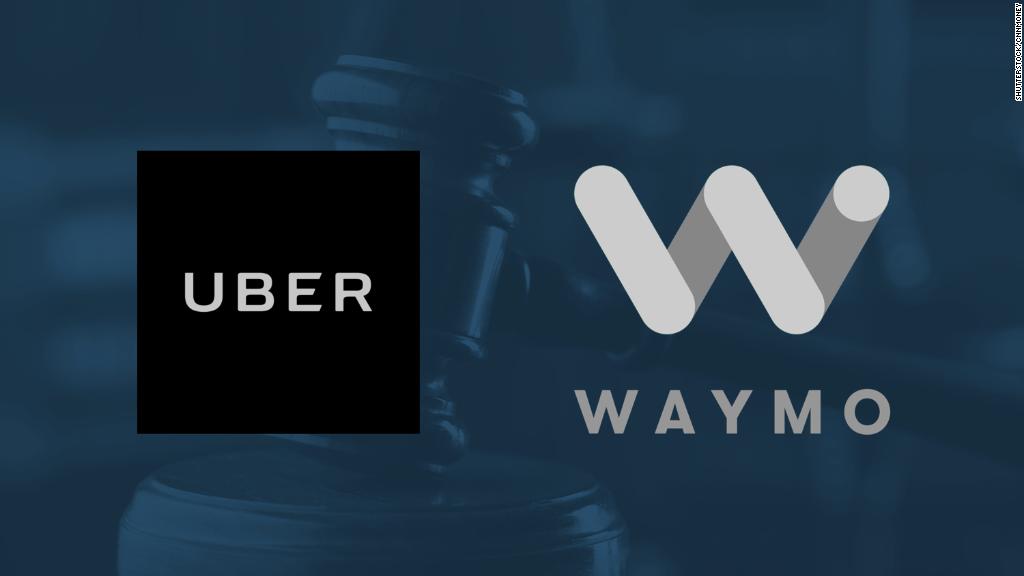
Waymo is accusing Uber of "cheating" to get ahead in the self-driving car race.
The companies were in court on Monday in San Francisco over a lawsuit that alleges that Uber used Waymo's existing autonomous vehicle technology to further its own development.
During opening remarks, Waymo attorney Charles Verhoeven said evidence will show a scheme between Uber executives and a former Google engineer to bring proprietary technology to Uber.
Waymo was formerly a division within Google. It later spun off into its own company under Alphabet, the umbrella company over Google.
The investigation into potential trade-secret theft began in late 2016 when Waymo accidentally received an email from a supplier containing an attachment that detailed Uber's LiDAR circuit board. Waymo claimed it looked suspiciously like its own design.
The trial started Monday before Judge William Alsup. Press, attorneys and spectators packed the courthouse. The trial is expected to take two weeks.
"This is about two competitors, where one competitor decided they needed to win at all costs," Verhoeven said. "Losing was not an option."
Related: Uber and Waymo head to court over trade secrets
Verhoeven argued that Uber executives, including former CEO Travis Kalanick, were aware that Anthony Levandowski, previously a Google engineer, brought trade secrets to Uber.
Waymo alleged Levandowski stole 14,000 files containing secret self-driving car data from Google before abruptly quitting to start a new company. Levandowski founded a self-driving truck company called Otto in January 2016. Uber then bought Otto for $680 million in August 2016.
"The evidence is going to show a trail of a knowing effort to induce Mr. Levandowski from Waymo, take the trade secret tech he'd already developed, and bring it to Uber," Verhoeven said.
During their opening remarks, Uber lawyers distanced the company from Levandowski, telling jurors that he is no longer with the company. He was fired from Uber in May 2017 after failing to cooperate with the company.
"Uber regrets ever bringing Levandowski on board," Uber attorney Bill Carmody said. "For all his time at Uber, all Uber has to show for Levandowski is this lawsuit."
Uber's lawyer read an email from a Google engineer to Waymo attorneys in October 2016 during their investigation. It said the technology Levandowski took from Waymo is not critical for its self-driving efforts.
"It's all electronics designs, schematics and PCB layouts and the component library for their creation," the email said. "It was considered low-value enough that we considered hosting it off Google infrastructure."
Related: Americans are slowly warming up to self-driving cars
Uber denied using proprietary Waymo technology and said it has used only its own tech in developing self-driving cars.
Carmody, the Uber lawyer, said Waymo feared that its rival would hire top talent from the robotics and autonomous car industry.
Jurors must decide whether Uber knowingly used these trade secrets to develop self-driving cars.
"I want to tell you right up front, it didn't happen. There's no conspiracy; there's no cheating," Carmody said in his opening statement.
Before proceedings began, Judge Alsup said no one would be getting special treatment in the trial.
"Someone who has a witness who thinks he's important wanted a private room: No," he said without naming anyone specific. "No one on either side gets a private room just because they're famous."
Waymo CEO John Krafcik testified on Monday.
Kalanick is also expected to testify later this week and is on the witness list for both parties.
Levandowski is also on the prospective witness list. He was ordered to turn over documents and other information related to the case in March. However, he exercised his Fifth Amendment right to avoid self-incrimination.

